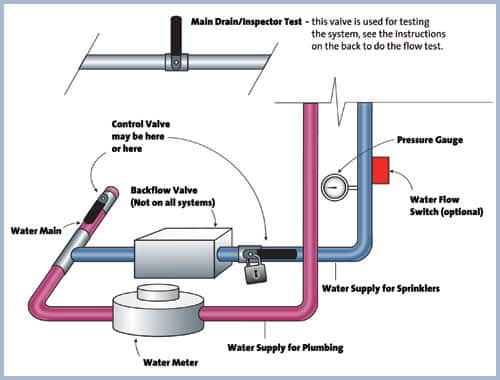Are automatic fire sprinklers coming to a home near you?
According to the U.S. Fire Administration, a growing number of communities are promoting, even requiring, residential automatic fire sprinklers.
ASHI Certified Inspector Max Curtis, Max Inspect, is based in one such community, Livermore, California.
Other communities that have initiated or plan to initiate residential sprinkler ordinances include the following:
San Clemente, Calif.
Corte Madera, Calif.
Montgomery County, Md.
Long Grove, Ill.
Chapel Hill, N.C.
Germantown, Tenn.
Scottsdale, Ariz.
Altamonte Springs, Fla.
Curtis said home inspectors in his area see a lot of automatic fire sprinklers. Recently, his chapter invited a fire inspector to speak at the chapter’s education session to provide inspectors with information about residential sprinklers even though the systems are outside the scope of a home inspection.
According to Curtis, when encountered, home inspectors usually disclaim them, but he said he tells clients to be careful when in the attic.
Residential Sprinkler System Myths and Facts
It is the official position of the U.S. Fire Administration that all Americans should be protected against death, injury and property loss resulting from fire in their residences. All homes should be equipped with smoke alarms and automatic fire sprinklers.
To encourage acceptance of its position, the administration published a list of myths and facts that may be of interest to clients considering buying a home with sprinklers. The following is taken from that list:
Myth
Water damage from a sprinkler system will be more extensive than fire damage.
Fact
Water damage from a sprinkler system will be much less severe than the damage caused by water from firefighting hoselines or smoke and fire damage if the fire goes unabated. Quick response sprinklers release 8 to 24 gallons of water per minute compared to 50 to 125 gallons per minute released by a firehose.
Sprinklers are highly reliable devices that are activated by heat. They will go off only if there is a fire that increases the heat beyond the sprinkler trigger point (typically 135 to 165°F (57.2 to 73.9°C)). Preaction systems employ additional safety features.
Research has demonstrated that only one in 16 million heads ever activates by accident.
Sprinkler systems can be connected to an alarm monitoring company or an external alarm that will notify neighbors or passersby of a water flow. This will facilitate the prompt notification of the fire department and will minimize the amount of water damage.
Myth
When a fire occurs, every sprinkler head goes off.
Fact
Sprinkler heads are individually activated by fire. Residential fires are usually controlled with one sprinkler head, and 90 percent of all fires are controlled with six or fewer heads. A study conducted in Australia and New Zealand covering 82 years of automatic sprinkler use found that two or fewer sprinklers controlled 82 percent of the fires that occurred.
Myth
A smoke alarm provides enough protection.
Fact
Sprinklers provide a high level of life safety. Statistics demonstrate that there has never been any multiple loss of life in a fully sprinklered building. Property losses are 85 percent less in residences with fire sprinklers compared to those without sprinklers. The combination of automatic sprinklers and early warning systems in
all buildings and residences could reduce overall injuries, loss of life, and property damage.
Myth
Sprinklers are ugly; I don’t want them in my space.
Fact
Residential and commercial sprinkler heads come in a variety of unobtrusive styles and models and in designer colors. Some can be mounted flush with the ceiling line and concealed.
Myth
Sprinkler systems are not practical in cold climates; the pipes will freeze and cause water damage.
Fact
In commercial applications, dry pipe and preaction sprinklers provide an alternative to water-filled pipes. Anchorage, Alaska, has had a residential sprinkler ordinance in place for more than 10 years and residents have not experienced a single sprinkler system freeze-up.
Specially molded insulation is available to ensure that piping in unheated attics is properly insulated and protected from freezing.
A variety of sidewall sprinkler heads are available. Sidewall sprinkler piping is placed in the interior walls to prevent exposure to cold attics and eliminate the concern for freezing.
Residential sprinkler systems use plastic and copper piping similar to that used for domestic water systems. If the heat in a house drops to a level where the sprinkler system will freeze, it is likely that the domestic system will also freeze. There is no unique danger of freezing with sprinkler systems that does not already exist with domestic water systems.
Myth
Smoke alarms set fire sprinklers off.
Fact
Fire sprinklers and smoke alarm systems are designed to activate according to different conditions. Sprinkler heads are individually heat-activated, usually at 165°F.
Smoke alarms, when activated, give only an audible warning sound; they do not cause fire sprinklers to flow water. In commercial applications where flooding volumes are needed to control hazardous areas, preaction and deluge systems may use smoke detection for early notification and operation.
Myth
Smoke alarms will put the fire out.
Fact
This is a dangerous and misleading statement that is many times made on the basis that smoke alarms will alert the occupants, who will then get a fire extinguisher to put out the fire.
Untrained persons should use fire extinguishers only to fight small incipient fires. The number-one priority when you hear a smoke alarm or a fire alarm is to get everyone out of the building.
Myth
Fire sprinkler systems are not reliable.
Fact
Laboratory testing and a 50-year installation/activation history clearly show that fire sprinkler systems exceed a 95 percent “fail-safe” status.
Myth
Property will have to pay an expensive yearly testing fee.
Fact
Like any piece of mechanical equipment, sprinkler systems must be inspected, tested and maintained to ensure a high degree of reliability. No one would buy a car and then never bother to change the oil, tires or get a tune-up. Testing fees will be directly related to the market demand.
Myth
Insurance costs will go up due to fire sprinkler system ruptures and leaks.
Fact
Consider these facts:
Sprinkler head failure rate is one in 16 million.
Domestic plumbing ruptures and leaks are over a 1000-to-1 ratio compared to sprinkler system ruptures and leaks.
If an insurance company wants to place a surcharge on your policy because you have a sprinkler system, there are other insurance companies that value the reliability and effectiveness of fire sprinkler systems and will reduce your policy premiums if you have fire sprinkler protection, especially in rural or “unprotected areas” in our country.
Some insurance companies are the leading advocates for fire sprinklers.
Myth
Fire sprinkler systems cause taxes to go up.
Fact
Not when local government practices fiscal diligence.
While the overall property value increases in sprinklered buildings, the fire protection costs may go down, especially in communities that can maximize all the benefits afforded by using fire sprinkler protection. Reductions in water service sizes, hydrant spacing, fire service costs, and damage repair can be reduced.
Some progressive local governments offer tax incentives to encourage homeowners to install fire sprinkler systems in their dwellings.
Go to www.homefiresprinkler.org for more information and fact sheets.
Source: U.S. Fire Administration, 16825 S. Seton Ave., Emmitsburg, Md. 21727, 301-447-1000.
To Read the Full Article
ASHI offers its members unparalleled resources to advance their careers. ASHI offers training for inspectors at all levels of knowledge and experience, including resources about all major home systems. Members benefit from a vast network of experienced professionals, providing a community for mentorship and knowledge sharing..
In this Issue

FIND A HOME
INSPECTOR
Professional Networking
Grow your professional network, find a mentor, network with the best, and best part of the community that’s making home inspection better every day.

